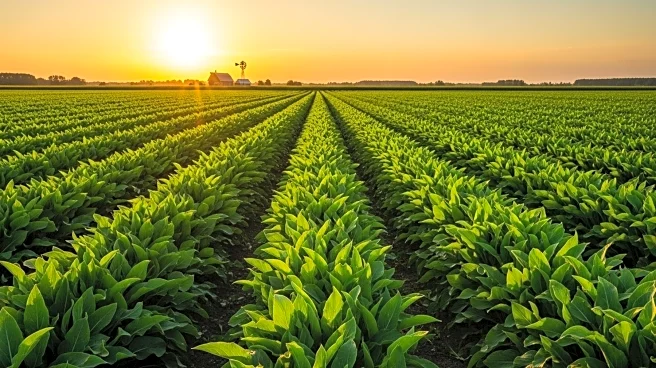What is the story about?
What's Happening?
The University of Arkansas System Division of Agriculture has released an analysis indicating that Arkansas farmers are facing substantial financial losses for their principal crops, including corn, cotton, long grain rice, and soybeans. The report, titled 'The State of the Arkansas Crop Economy in 2025,' was conducted by extension economists Hunter Biram, Ryan Loy, and Scott Stiles. It highlights the economic challenges faced by farmers due to low crop prices and high operating costs. The analysis predicts losses of $273.71 per acre for corn, $352.75 per acre for cotton, $258.84 per acre for long grain rice, and $85.02 per acre for soybeans. Despite record yields in 2024, farmers are unable to achieve profitability due to the current economic conditions.
Why It's Important?
This analysis underscores the severe economic pressures on Arkansas farmers, which could have broader implications for the agricultural sector and rural economies reliant on farming. The combination of low crop prices and high input costs, such as fertilizers and labor, is squeezing profit margins, potentially leading to financial instability for farmers. The situation is exacerbated by global factors, including record production in South America and domestic stock levels, which are contributing to downward pressure on prices. The Trump administration is reportedly exploring initiatives to provide aid to farmers, including addressing rising input costs and considering direct subsidies through tariff revenue redistribution.
What's Next?
The ongoing financial challenges may prompt further government intervention to support farmers. Discussions around direct subsidies and aid programs are likely to continue as the administration seeks to mitigate the impact of economic pressures on the agricultural sector. Farmers may also need to explore alternative strategies to improve profitability, such as diversifying crops or adopting new technologies to reduce costs. The situation will require close monitoring to assess the effectiveness of any aid measures and their impact on the agricultural economy.
Beyond the Headlines
The financial difficulties faced by Arkansas farmers highlight the vulnerability of the agricultural sector to global market fluctuations and domestic economic policies. The widening gap between crop prices and input costs reflects broader economic trends that could have long-term implications for food security and rural development. The challenges also raise ethical considerations regarding the sustainability of current farming practices and the need for systemic changes to support farmers in adapting to evolving market conditions.
















